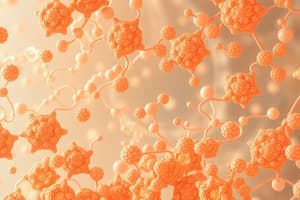Podcast
Questions and Answers
What is the primary function of biological membranes?
What is the primary function of biological membranes?
- To transport substances across the cell
- To provide energy to the cell
- To synthesize proteins
- To separate the cell from its environment (correct)
Which component is most commonly found in biological membranes?
Which component is most commonly found in biological membranes?
- Proteins
- Cholesterol
- Amphipathic lipids (correct)
- Carbohydrates
What term describes lipids that have both hydrophilic and hydrophobic properties?
What term describes lipids that have both hydrophilic and hydrophobic properties?
- Glycerolipids
- Amphipathic lipids (correct)
- Saturated lipids
- Trans fatty acids
Which of the following is NOT a component of biological membranes?
Which of the following is NOT a component of biological membranes?
What role do carbohydrates play in biological membranes?
What role do carbohydrates play in biological membranes?
Flashcards are hidden until you start studying
Study Notes
Biological Membranes
- Biological membranes act as barriers, separating the cell from its surroundings and dividing it into compartments.
- These membranes are composed of three primary components:
- Amphipathic lipids
- Proteins
- Carbohydrates
Amphipathic Lipids
- Amphipathic lipids are the most common type of lipid found in biological membranes.
- They have both hydrophilic (water-loving) and hydrophobic (water-fearing) regions.
- The main amphipathic lipids found in membranes include:
- Phospholipids
- Cholesterol
- Glycolipids
Studying That Suits You
Use AI to generate personalized quizzes and flashcards to suit your learning preferences.




